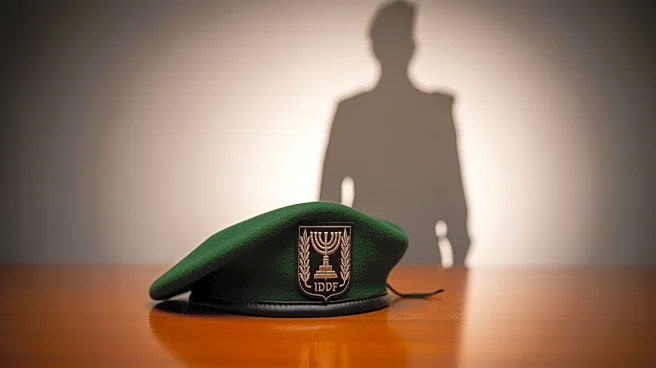What's Happening?
IDF Chief of Staff Lt.-Gen Eyal Zamir personally honored Matan Angrest, a former hostage, by gifting him a new black beret during a visit at Ichilov Hospital. This gesture followed Angrest's release and his subsequent attendance at the burial of his commander
and friend, Captain Daniel Peretz. Captain Peretz's remains were returned by Hamas earlier in the week, marking a poignant moment for Angrest and the IDF. The event underscores the ongoing tensions and human impact of the conflict involving Hamas and Israel, particularly following the October 7 massacre.
Why It's Important?
The personal involvement of IDF Chief of Staff Eyal Zamir in honoring Matan Angrest highlights the significance of individual acts of recognition within military and national contexts. This event serves as a reminder of the human cost of conflict and the importance of leadership in providing support and acknowledgment to those affected. The return of Captain Peretz's remains and the honoring of Angrest may bolster morale within the IDF and provide a sense of closure for those involved. It also reflects the broader geopolitical dynamics and the ongoing challenges faced by Israel in its interactions with Hamas.
What's Next?
The ceremony and personal recognition by Lt.-Gen Eyal Zamir may lead to further initiatives aimed at supporting former hostages and their families. The IDF might continue to engage in similar acts of recognition to strengthen unity and morale among its ranks. Additionally, the return of Captain Peretz's remains could prompt further diplomatic or military actions as Israel navigates its relationship with Hamas and seeks to address the aftermath of recent conflicts.
Beyond the Headlines
This event may have deeper implications for the cultural and ethical dimensions of military service and leadership. The act of gifting a beret symbolizes respect and solidarity, potentially influencing how military honors are perceived and valued within Israeli society. It also raises questions about the role of military leaders in addressing the emotional and psychological needs of soldiers and former hostages.
















